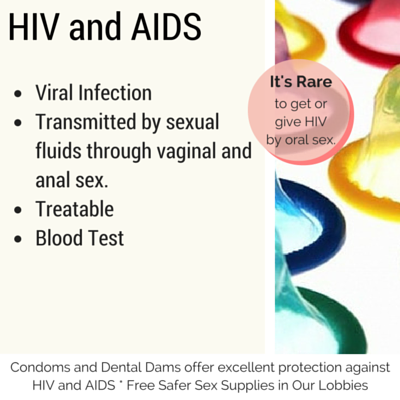HIV & AIDS

Human Immunodeficiancy Virus (HIV)
HIV or Human immunodeficiency Virus is a sexually transmitted virus believed by most experts to be the primary cause of AIDS (Acquired Immunodeficiency Syndrome), which can be fatal.
HIV can be a serious health risk, especially if it develops into AIDS (Acquired Immunodeficiency Syndrome). Currently there is no vaccine for HIV or a cure for AIDS, but the development of anti-viral drugs have greatly decreased the symptoms. *Statement about Prep*
Symptoms
Some people do not get any symptoms of HIV. Some of the symptoms of HIV might include:
- Flu like symptoms
- Body aches
- Fatigue
- Low grade fever
- Swollen lymph nodes
- Dry Cough
- Pelvic Inflammatory Disease
- Weight loss
- Diarrhea
- Red, pink, purple or brownish blotches in or on the skin
- White patches or lesions in the mouth
- Pneumonia
- Chronic vaginal yeast
- Confusion, memory loss & depression
If you have any of these symptoms, and are sexually active, you should be tested for HIV, and possibly other sexually transmitted infections (STI’s).
How Is HIV Transmitted?
Most people get HIV through sexual activity, contaminated needles (IV drug users), or blood transfusions (although this has rapidly decreased because of testing blood). HIV can be passed from mother to child via breast milk.
HIV is transmitted only through the following bodily fluids:
- Semen (which can be present in pre-ejaculate or "pre-cum")
- Breast Milk
- Vaginal Fluids
- Blood
Confidential Testing
Get tested for HIV at any WHS clinic. We test people of all genders. Our HIV test is a simple blood test.
It is a good idea to get tested for STI’s if you don’t know your partner(s) sexual history (even if you don’t have symptoms). Most people do not have symptoms of STI’s, and this can include HIV. Many treatments are available to control HIV, so the earlier you are tested the better.
It can take at least six months from the date of potential exposure to know your HIV status. It's important to get tested at 3 months, and 6 months after the date of your possible exposure, so your test is correct. The time from potential exposure to your test date is known as a "window period."
Using safer sex supplies during the window period protects you and your partners.
When people are unaware of their HIV status, it is advisable to practice safer sex as if they were positive for HIV. For people who have tested positive for HIV and want sexual involvement, condoms should be used every sexual episode. *Prep*
Treatment
If you are diagnosed as having HIV, you will be referred to a case manager who will help you with your new diagnosis. Your sexual partners(s) should be tested as well.
Case managers help you to manage this chronic illness, as well as offer emotional support for you and your loved ones.
Test Your Knowledge
1. True or False: A person of any gender can give HIV to a person of any gender.
2. True or False: Condoms and lube are a HIGHLY effective way to prevent the transmission of HIV.
3. True or False: Unprotected anal sex is the riskiest kind of sex, when it comes to HIV.
4. True or False: Oral sex carries a very low risk of HIV transmission.
5. True or False: New medication can't cure HIV, but can help people with HIV live long and healthy lives.
All True!